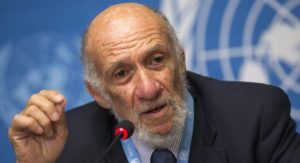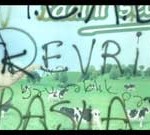Israeli Policies Satisfy The Definition Of Apartheid Under International Law
No Comments yetA furor has enveloped Washington, D.C. as Democrats and Republicans alike scramble to denounce Amnesty International for the report it released this month, which describes Israel as an “apartheid state” and alleges that the human rights abuses committed against Palestinians by the State of Israel constitute crimes against humanity under international law.
In many respects, there is nothing new in the report, as many other human rights organizations, including the UN, have long ago drawn the same conclusions. In fact, many Israelis themselves agree with the assessment of Israel as an apartheid state. Even the late Israeli politician Yossi Sarid, who served as minister of education and the environment back in the late 1990s and through the early 2000s, said the following in 2008 for the Israeli newspaper Haaretz: “What acts like apartheid, is run like apartheid and harasses like apartheid, is not a duck — it is apartheid.”
Even so, the report provoked an explosion of rage in the United States — most likely among the same group of people who used to object to critiques of South Africa’s system of apartheid and who viewed Nelson Mandela as a terrorist. The same frenzy of rage also surfaced in the U.S. back in 2017, when Richard Falk, the UN Special Rapporteur on the situation of human rights in the Palestinian occupied territories, produced a United Nations report charging Israel with crimes against humanity and labelling it an apartheid state.
In light of Amnesty International’s new report, we asked Richard Falk to share his thoughts on the latest findings about Israeli apartheid and crimes against humanity. Falk is professor emeritus of international law and practice at Princeton University, where he taught for nearly half a century, and chair of Global Law at Queen Mary University London, which has launched a new center for climate crime and justice. He is also the Olaf Palme Visiting Professor in Stockholm and Visiting Distinguished Professor at the Mediterranean Academy of Diplomatic Studies, University of Malta. In 2008, Falk was appointed as a United Nations Special Rapporteur on the situation of human rights in the Palestinian territories occupied since 1967. He is the author of some 50 books, the most recent of which is a memoir titled Public Intellectual: The Life of a Citizen Pilgrim (2021).
C.J. Polychroniou: Amnesty International’s new report exposes Israeli abuses against Palestinians. The report shows that Israel imposes a form of domination and oppression against Palestinians under its control that qualifies as a system of apartheid under international law. In this context, it affirms the 2017 United Nations report that you had helped produce and for which you were personally attacked by Nikki Haley at the Security Council. But Israel is arguing that the report is full of lies, and some of its strongest allies (the U.S., the U.K. and Germany) are rejecting the description of Israel as an apartheid state. Let’s start with the most basic question of all: Is there anything in the report that is not true? If not, why has it caused such a bipartisan fury in the U.S.?
Richard Falk: I think it is important to assess the Amnesty International report in the wider context of the perception of Israeli apartheid over the course of the last five years, since the issuance of the United Nations Economic and Social Commission for Western Asia’s (ESCWA) “Report on Israeli Practices Towards the Palestinian People and the Question of Apartheid” in 2017.
In 2021, two comprehensive reports by widely respected human rights organizations added weight to the apartheid allegations. The first one — titled “A Regime of Jewish Supremacy from the Jordan River to the Mediterranean Sea: This is Apartheid” — was published in 2021 by the most established and internationally trusted Israeli NGO devoted to the protection of human rights, B’Tselem. It has developed an outstanding reputation for professionalism over the years. The second report — titled “A Threshold Crossed: Israeli Authorities and the Crimes of Apartheid and Persecution” — was issued in April 2021 by Human Rights Watch, the flagship human rights civil society organization in the United States with offices around the world.
The Amnesty International report released this February — titled “Israel’s Apartheid Against the Palestinians: Cruel System of Domination and Crime Against Humanity” — should be seen as the culmination of a trend validating allegations of Israeli apartheid, at least within international civil society.
To dismiss and denigrate these reports adhering to the highest human rights research standards — as Israeli and American leaders and spokespersons have attempted to do, calling the Amnesty International report full of “lies” and the work of “anti-Semites” — is a shameless slander. Such inflammatory language is designed to shift the conversation from the message to the messenger. This interpretation of the tactics of those rejecting the Amnesty International report is strengthened by the absence of any serious effort to refute the substantive charges. So far there has been a bipartisan angry rejection of the Amnesty International report in Congress, and virtual silence in the mainstream TV and print media. How different would be the U.S. reaction to an Amnesty report summarizing the breakup of Hong Kong demonstrations or damning the Chinese denial of human rights to the Uyghur minority. The inevitable conclusion reached is that international law and human rights function for the U.S. government as geopolitical tools rather than normative principles.
Another element of context seems highly relevant. This pushback against the Amnesty International report should be understood in light of a recent Israeli campaign to demonize the protection of human rights in Israel and Occupied Palestinian Territories. The most dramatic move of this character was the executive order issued on October 19, 2021, by the Israeli Defense Minister, Benny Gantz, declaring six of the most respected civil society organizations in the West Bank to be “terrorist organizations” on the basis of secret and undisclosed evidence deemed “legally dubious” even in liberal Israeli media venues such a Haaretz.
A large sector of public opinion in North America and Europe, including in liberal Zionist circles, was shocked by Gantz’s crude move, which was followed by a milder declaration from Major General Yehuda Fuchs, the military commander in the West Bank, that five of the six organizations listed by Gantz were “unlawful associations” under his authority to issue Emergency Regulations. (The one organization exempted from the list had previously been earlier so designated). At least General Fuchs refrained from repeating the more severe condemnation of Gantz, but the intention was the same: to inhibit donors and to neutralize the efforts of civil society to cope with the hardships of prolonged Israeli occupation of the West Bank and attendant violations of international humanitarian law.
A final issue of context results from Israel’s Knesset in the form of the 2018 Basic Law proclaiming Israel as the Nation-State of the Jewish people, who alone have the right of self-determination within Israel’s still unspecified borders, with the settler communities on the West Bank clearly intended to be incorporated as part of Israel. The importance here is the extraordinary claim of Jewish exclusivity in what had been for centuries the homeland of a majority Palestinian population. When the colonialist Balfour Declaration was created in 1917, the Jewish minority in Palestine was less than 10 percent of the total population of Palestine, despite feverish efforts over 20 years of the Zionist Movement to settle Palestine with as many Jews as possible.
These issues of context are of help when assessing both the Amnesty International report and the criticisms directed at it. Responding directly to your inquiry about whether there is reason to accord credibility to the Israeli response: In long reports of this nature there are sure to be contradictory ways of interpreting the evidence. The legal profession depends upon the plausibility of such diverse readings of the evidence. Yet, having collaboratively written one report and carefully read the others, I can assure you that there is no “lie” or even irresponsible allegation in any of the four reports. Because of the sensitivity surrounding accusations of apartheid directed at Israel as well as the realistic apprehension that Israel and its most ardent supporters habitually resort to dirty tactics to discredit critics, I believe any objective reading of the reports would confirm their compliance with the highest standards of competence and canons of responsible investigation. Unlike the apartheid leaders of South Africa, Israel’s leaders deny the charges of apartheid altogether rather than defend their appropriateness given the nature of Israel as a state of the Jewish people, and instead irresponsibly attack the integrity of the report and the despicable motivations attributed to its sponsors.
You also understandably ask “why the fury?” If the reports themselves are not mendacious but are instead serious objective assessments of allegations, then why would Israel not respond in kind with contrary interpretations of the evidence or by a show that the Israeli system of control is consistent with a reasonable construction of Israeli security imperatives? After all, Israel has plenty of skilled jurists who go along with the prevailing Israeli policies based on Jewish supremacy. For instance, the Israeli Supreme Court upheld the legality of 2018 Basic Law, and its chief judge even had the temerity to assert that the law didn’t alter the democratic character of the Israeli state.
I suppose that at some point an attempt will be made to put forward an argument, differing in nature from South Africa’s overt legal, moral and political defense of apartheid. Israel would not venture an admission of apartheid but would deny its applicability through a reasoned denial of the basic charges. Such an approach by way of legalism will be quite a stretch given the essentially uncontested evidence that Israel’s policies and practices do satisfy the definition of apartheid as accepted in international law circles, which rests on systematic and specific intent to impose a racially coded system of domination on a subjugated ethnicity.
I would contend that from the time of the 1948 War, during which more than 700,000 Palestinians were uprooted from their homeland, mostly becoming refugees in neighboring Arab countries, Israel was administering race relations according to an apartheid ethos. The destruction of several hundred Palestinian villages was a complement to the wartime mass departure. Israeli intentions became clear by an official blanket denial to Palestinians of the international law of right of return. These features accompanying the establishment of Israel lend credence to the view that apartheid was integral to Israel’s state-building project all along.
Israel is understandably distressed by this growing civil society consensus that its treatment of the Palestinians amounts to apartheid. To begin with, apartheid is listed as one of the crimes against humanity in Article 7 of the Rome Statute governing the operations of the International Criminal Court. As the Amnesty International report contends, if apartheid exists, then there is present an international responsibility to take steps to bring it to an end. Although Israel has refused to govern its behavior by international law standards, it nevertheless deeply resents being so charged. It is especially reactive to critics and organizations that have a positive and generally apolitical reputation, which includes Amnesty International, Human Rights Watch and B’Tselem.
There is still the puzzle posed by Israel’s long record of defying international law without suffering adverse consequences, a position made possible by the unconditional geopolitical support provided by the United States, which is also often reinforced by its European allies. It is notable that despite the civil society consensus, few governments other than that of post-apartheid South Africa have been prepared to go along with the apartheid allegation in intergovernmental contexts, presumably fearing a backlash.
Yet, it is admittedly not foolish for Israeli officials and think tank policy experts to be worried. Even though Israel will not waver in its rejection of the apartheid allegation at this time or alter its policies of domination and victimization, it has suffered a serious setback. Symbolic politics have an underappreciated relevance to the resolution of internal and international conflicts ever since 1945. This relevance runs counter to the lingering, anachronistic belief of political realists that the flow of world history reflects relative military capabilities. It should be illuminating to realize that the anti-colonial wars were eventually won by the nationalist side that prevailed on the symbolic battlefields of Legitimacy Wars, rather than by the side that controlled the combat zones.
The U.S. experiences in Vietnam, Iraq and Afghanistan illuminate various facets of this shift in the post-World War II balances of power that derive from the resolute pursuit of legitimate grievances, and the weakening of capabilities that arise from losing the Legitimacy War. Beyond this, Israel has learned from the South African experience that anti-racism and anti-colonialism have strong mobilizing appeals in contemporary world society that can give rise to powerful global solidarity campaigns that encourage national resistance, and eventually influence the calculations of political leaders. Such concerns help explain Israel’s excessively punitive reaction to the nonviolent Boycott, Divestment and Sanctions (BDS) campaign.
Let’s talk about the concept of apartheid. There is clearly severe discrimination inside Israel against Palestinians, but one could argue that there are many analogues elsewhere, including in the U.S. What are the similarities between apartheid South Africa and contemporary Israel (a comparison, by the way, which Amnesty International’s report shies away from) in terms of the latter’s treatment of Palestinians living inside Israel?
The criminal internationalization of the South African regime of racial supremacy gradually occurred during the aftermath of World War II. It featured the role of the United Nations in a campaign of delegitimation of South Africa’s form of racism, first concentrating on the former German colony that came under the control of Pretoria after World War I, and later reaching to the internal approach taken by the Afrikaner leadership in South Africa. This latter development was the most direct encroachment on territorial sovereignty in the early experience of the UN. It resulted in declaring apartheid to be an international crime, initially in the 1973 International Convention on the Suppression and Punishment of Apartheid, and more recently enumerated in Article 7 of the Rome Statute governing the International Criminal Court. It is important to understand that the origins of this crime are entirely bound up with the experience of South Africa, and its internationalization from the outset was intended to reach any system of overt domination and victimization based on race, without any requirement that a racist regime resemble what prevailed in South Africa.
The most widely accepted definition of apartheid is contained in Article 2 of the 1973 International Convention on the Suppression and Punishment of Apartheid. Racism, understood as discrimination based on ideas of ethnic superiority and inferiority, does not necessarily imply apartheid. For instance, the Nazi genocidal approach was unconcerned with using the state and its administrative apparatus to keep the races apart, as its genocidal intention was to exterminate races deemed inferior, especially Jews and Roma.
Separation and racial discriminatory policies and practices are crucial components of apartheid forms of control, but by themselves they lack the element of specific intent (as evidenced and sustained by cruel acts) to form a system of domination with the purpose of keeping the subjugated race under the explicit control of the dominant race. In Israel and Occupied Palestine, this has meant domination by Jews as implemented by an array of administrative decrees and nationality laws restricting immigration of non-Jews, and denying Palestinian refugees the right of return, which is an international legal entitlement.
Even the sort of systemic racism that exists in the United States is embedded in the socio-economic-culture of the society rather than functioning as an expression of the overt ideology and practices of the state. To be sure, sub-national political entities are complicit to varying degrees in carrying out racist policies, which is often exhibited by allowing racist civil society sentiments to shape the behavior of public institutions. The United States continues to be shaped by impacts from its notorious past, which featured the application of a genocidal approach toward the Indigenous community and a labor system in agriculture based on generations of slavery. This dubious legacy is illustrated by the disposition in the South of trial juries to acquit white defendants accused of murdering Black people, while rushing to guilty verdicts — however scant the evidence — if it is a matter of a Black defendant accused of murdering a white woman. Also, double standards in policing expose the deep roots of anti-Black racism in the U.S. as corroborated by the Black Lives Matter movement and the complex, contradictory societal reactions to the police homicide of George Floyd in May of 2020 in the northern U.S. city of Minneapolis.
The similarities between Israeli and South African apartheid relate to the historical and ideological narratives of both countries in which European settlers displaced, subjugated and exploited the resources of the Indigenous population, and claimed rights of ethnic supremacy based on race. In both South Africa and Israel, native claims to homeland were denied, and the settlers took over control of all aspects of governance with the intention of keeping the natives permanently under strict control, using law and lawmaking as a principal tool of control by the state.
The dissimilarities between Israel and South Africa derive from fundamental demographic, economic and ideological considerations. The fact that the white minority was never more than 25 percent of the South African population meant that inclusive democracy was never entertained as a legitimating option, while for Israel it was fundamental to the Zionist Project of establishing and legitimating a Jewish homeland in Palestine, which invoked biblical and historical connections to the land that went back for hundreds of years. Israel’s first and most illustrious president, David Ben Gurion, despite his secularized Judaism, famously declared “the Bible shall be our weapon.”
A further fundamental dissimilarity relates to the economic role of Blacks in South Africa and Palestinians in Israel. South African wealth was derived mainly from extractive activities involving mining, which depended on a large source of cheap labor. In contrast, Palestinian cheap labor was seen as undercutting a well-organized labor movement at the core of the Zionist movement, and was considered inessential to the growth and development of Israel. The Israeli economy came to increasingly emphasize high technologies, including armaments, in part to avoid any future dependence on Palestinian labor. In this regard, many on the Israeli right, even now, favor “ethnic cleansing” of Palestinians to achieve racial purity in Israel and to complete the work of de facto annexation of the West Bank. These concerns reference the so-called “demographic bomb” that is seen as posing a future threat to the presently solid Jewish majority in Israel. This threat arises from the higher Palestinian fertility rate, which if Israeli annexation plans become fully realized would lead to a 50:50 division of the combined population of 14 million living in Israel plus the Occupied Palestine, which is seen by most Israelis as intolerable with even worse to come.
I raised the previous question about the relevance of the comparison between apartheid South Africa and contemporary Israel because when it comes to the occupied territories, the situation is actually far worse than apartheid. Noam Chomsky once remarked to me that “South Africa needed its Black population, and catered to them at least to a limited extent. Israel had no need of the Palestinians in the occupied territories and is making life unlivable for them.” I think this raises some crucial questions about the broader use of the term “apartheid” when it comes to describing the Israeli treatment of Palestinians in the occupied territories.
In my understanding, Chomsky’s essential insight is correct and significant, but I do not agree that South Africa catered to the Black population more than Israel caters to Palestinians. Because Israel rests its claims on being “democratic,” it caters to the Palestinian minority of 20 percent in a variety of ways to sustain its international image of political legitimacy. The South Africans drew strict color lines that deprived Blacks of any civil or political rights, while Palestinians in Israel can vote and even form their own political parties and serve in the government.
The greater harshness of Israeli apartheid arises from the Israeli ambition to control a relatively limited territory as compared to the South African ability to rely on African townships and Bantustans for purposes of segregation, security and control in a rather sparsely populated country. In effect, the proximity and demographic vitality of the Palestinians, “the dangerous neighborhood” of hostile Arab countries, and the character of Palestinian armed resistance led Israel to be more engaged in violent repressive activities than were the South Africans, especially in Gaza. Also, Israeli concerns with demographic implications of a diminished Jewish majority led to its adoption of a politics of fragmentation involving the dispersal of Palestinians beyond Israel’s borders. South Africa, as devising apartheid from the perspective of a racial minority, never had to cope with these Israeli concerns.
Source: https://truthout.org/
C.J. Polychroniou is a political scientist/political economist, author, and journalist who has taught and worked in numerous universities and research centers in Europe and the United States. Currently, his main research interests are in U.S. politics and the political economy of the United States, European economic integration, globalization, climate change and environmental economics, and the deconstruction of neoliberalism’s politico-economic project. He is a regular contributor to Truthout as well as a member of Truthout’s Public Intellectual Project. He has published scores of books and over 1,000 articles which have appeared in a variety of journals, magazines, newspapers and popular news websites. Many of his publications have been translated into a multitude of different languages, including Arabic, Chinese, Croatian, Dutch, French, German, Greek, Italian, Japanese, Portuguese, Russian, Spanish and Turkish. His latest books are Optimism Over Despair: Noam Chomsky On Capitalism, Empire, and Social Change (2017); Climate Crisis and the Global Green New Deal: The Political Economy of Saving the Planet (with Noam Chomsky and Robert Pollin as primary authors, 2020); The Precipice: Neoliberalism, the Pandemic, and the Urgent Need for Radical Change (an anthology of interviews with Noam Chomsky, 2021); and Economics and the Left: Interviews with Progressive Economists (2021).
You May Also Like
Comments
Leave a Reply










